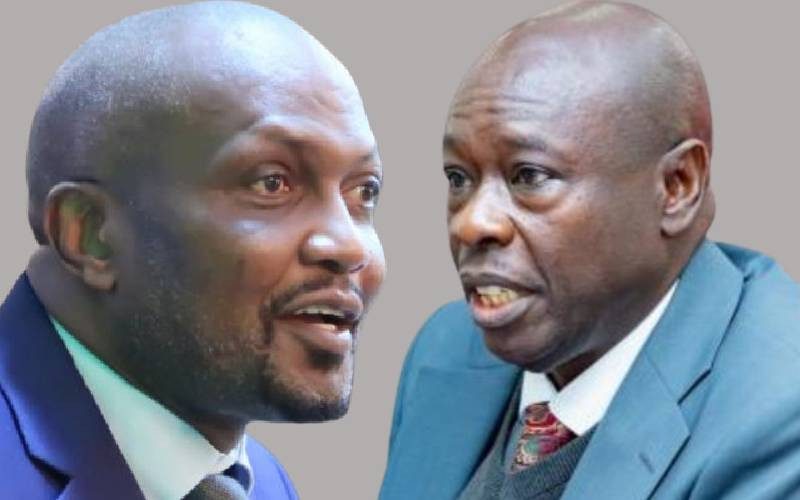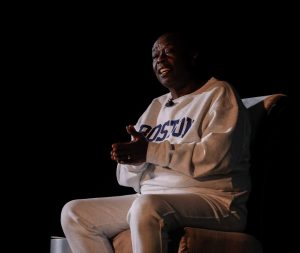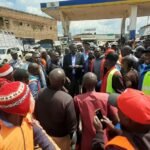The political feud between former Deputy President Rigathi Gachagua and former Presidential economic adviser Moses Kuria has escalated into a bitter public exchange, with explosive allegations linking both leaders to one of Kenya’s most controversial political incidents – the infamous raid on former President Uhuru Kenyatta’s Northlands farm.
The dramatic confrontation centers around the March 27, 2023 invasion of the Kenyatta family’s 11,000-acre Northlands property in Ruiru by hundreds of unknown goons who broke through the fence, stole over 1,500 Dorper sheep, and destroyed trees on the vast estate.
The brazen daylight raid, which was captured on video and broadcast across national television, sent shockwaves through Kenya’s political establishment and raised serious questions about political intimidation and the rule of law.
Speaking from Boston during his ongoing United States tour, Gachagua had initially cautioned Mount Kenya residents against trusting Kuria’s political messaging, alleging that the former adviser’s public positions were merely extensions of President William Ruto’s political agenda.
“When you see a party or an individual like Moses Kuria praising certain ideas or directions, understand that it is aligned with what the President wants,” Gachagua had stated, suggesting there was a calculated strategy to divide Mount Kenya votes.
However, Kuria’s response has turned the political discourse on its head with stunning criminal allegations that directly implicate his former ally in the Northlands incident.
In a social media post that has since gone viral, Kuria admitted to accusations of supporting controversial figure Maina Njenga but turned the tables with a devastating counter-claim.
“Rigathi Gachagua has accused me during his tour of the US of funding and supporting Maina Njenga. I am guilty as charged. I learnt from the best. I was in the room when Rigathi paid the same people money to steal Uhuru Kenyatta’s goats from Northlands,” Kuria wrote, providing what he claims is first-hand testimony of criminal conspiracy at the highest levels of government.
The Northlands raid remains one of the most controversial episodes in Kenya’s recent political history.
The invasion involved armed goons wielding machetes and axes who not only stole over 1,500 valuable Dorper sheep but also went on a destruction spree, felling trees and setting parts of the property ablaze.
The scale and coordination of the attack suggested significant planning and resources, leading to widespread speculation about political involvement.
Former President Uhuru Kenyatta, who had remained silent for months after the incident, eventually broke his silence in May 2023, describing the invasion as “an intimidation ploy to keep him off politics”.
His statement confirmed what many political observers suspected – that the raid was not random criminal activity but a calculated political attack designed to send a message.
The timing of the Northlands invasion was particularly significant, occurring during a period of heightened political tensions between the Kenya Kwanza government and the opposition Azimio coalition, of which Uhuru was a key supporter.
Immediately after the raid, Moses Kuria, who was then serving as Trade and Investment Cabinet Secretary, was reported to have celebrated the invasion, raising questions about government involvement or approval of the incident.
Opposition leader Martha Karua had previously alleged that both Gachagua and Kuria hired goons for various political activities, claiming the duo had meetings with these groups and instructed them to cause chaos.
These earlier allegations now take on new significance in light of Kuria’s specific claims about the Northlands incident.
The aftermath of the raid revealed the extent of the criminal enterprise involved.
Weeks after the initial theft, sheep began mysteriously reappearing near the farm, with people believed to be aides of Nairobi politicians dropping off animals along the Eastern Bypass.
By May 2023, at least 50 of the nearly 1,500 stolen sheep had been returned, with those returning them telling farm staff they “did not want to be cursed” .
Kuria’s current allegations provide a potential missing link in understanding how such a massive, coordinated operation could have been funded and executed.
His claim of being present when payments were allegedly made by Gachagua suggests intimate knowledge of the criminal conspiracy, if true.
The political implications of these mutual accusations extend far beyond personal animosity between two former allies.
Both Gachagua and Kuria were instrumental in President Ruto’s rise to power and were considered key figures in securing Mount Kenya’s support for the Kenya Kwanza coalition.
Their current public warfare exposes deep fractures within the region’s political establishment and raises questions about the methods used to consolidate power.
The Northlands incident had been previously linked to Kenya Kwanza politicians, with reports suggesting some leaders in the coalition were blamed for hiring the goons.
Kuria’s specific allegations now provide what he presents as insider testimony about the funding mechanisms behind the operation.
The deteriorating relationship between these two political figures reflects broader tensions that have characterized their post-election period.
Kuria’s recent resignation from his position as senior economic adviser, which he announced came after a personal meeting with President Ruto, adds another layer to the complex political dynamics at play.
For the people of Mount Kenya, whom Gachagua was ostensibly trying to protect with his original warnings about political manipulation, these revelations present a troubling picture of leaders willing to engage in criminal activity and then publicly expose each other when their alliances sour.
The criminal nature of Kuria’s allegations, particularly his claim of witnessing payment for theft, raises serious questions about whether these matters should be pursued through legal channels rather than remaining part of political theater.
The specific details he provides suggest a level of knowledge that could be legally significant if investigated by appropriate authorities.
As this explosive political feud continues to unfold, the broader implications for Kenya’s political landscape remain unclear.
What is certain is that the public washing of dirty linen by these former allies has provided unprecedented insight into the allegedly criminal methods some politicians may employ in their pursuit and maintenance of power.
The Northlands raid, once seen as an isolated incident of political intimidation, now appears to be part of a broader pattern of alleged criminal activity that may have reached the highest levels of government, according to Kuria’s explosive claims.
Kenya Insights allows guest blogging, if you want to be published on Kenya’s most authoritative and accurate blog, have an expose, news TIPS, story angles, human interest stories, drop us an email on [email protected] or via Telegram
Share via:





